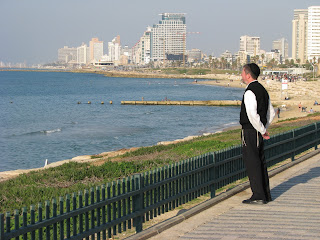We've spent the past couple of days in the north, my favorite part of Israel. I love the Galilee: the sense of spaciousness, the verdant landscape, cascades of blooming flowers, rugged mountains, sparkling blue waters of the Kinneret (Sea of Galilee) and the generally laid back pace of life.
This afternoon, we ate lunch in Rosh Pinna, which has become quite the upscale town. It reminds me a bit of Boulder, Colorado, with its mountain views, abundance of fine restaurants, tasteful affluence and left-learning politics.
Then we continued up the mountains to Tzefat, the home of Lurianic kabbalah. One can see why Jewish mysticism took root here. There's just something in the atmosphere that inspires spirituality and awe. The town is perched high in the hills, opposite Mount Meron, where one finds the tomb of R. Shimon bar Yochai, the purported author of the Zohar. With its winding, narrow alleyways, steep stairs, historic synagogues, and eclectic population, it is not hard to see the appeal of the place to visionaries--from Rabbi Yitzchak Luria, the Ari, to a host of contemporary artists. Time just moves differently here.
But my favorite part of today was a trip to Kol Shofar, a family-run shofar factory in the Golan Heights.
We learned a great deal about the shofar on our tour. It can be made from the horn of any animal except a cow (due to the association with the Golden Calf). Our guide, the son of the founder and master shofar crafter, reminded us that the Hebrew word shofar is derived from the verb l'shaper, meaning "to improve." The shofar calls us to improve ourselves.
At Kol Shofar, interestingly enough, most of the horns come from Islamic countries. In those places, people slaughter the animals primarily for food, then sell the shofar as a by-product to the factory. The horns are cut and sometimes heated and straightened, their mouth-pieces are shaped and then drilled, and then they are (mostly) polished (some Sephardi Jews, following Maimonides, prefer to use an un-polished shofar). We saw shofars made out of the horns of rams (most common and often preferred), goats, ibyx, kudu and sheep.
I bought a very unusual shofar, from the horn of an African animal called an oryx. Many halachic authorities frown on this rare form of shofar, since it is rather straight, and Jewish tradition expresses a preference for a bent or curved shofar. The talmudic debate on this matter is interesting:
The Mishnah (Rosh Hashanah 26b) has a dispute between the Tanna Kamma (the first, anonymous opinion) and R. Yehudah regarding the shofar blown on Rosh Hashanah. According to the Tanna Kamma, the shofar used on Rosh Hashanah should be straight and from a ya’el. According to R. Yehudah, it should be from a male (and curved). The Gemara asks why the Tanna Kamma prefers a straight shofar and R. Yehudah a curved shofar and answers that according to the Tanna Kamma on Rosh Hashanah people need to straighten their minds and according to R. Yehudah they need to bend themselves in prayer.
R. Yehudah won the day and the curved shofar--reflecting the impulse to bow before the Creator--became the norm.
But the straight shofar from the oryx appealed to my aesthetic and, perhaps more critically, my tendency towards inconoclasm. I like to question established norms, even as I respect traditions.
With that said, the older I get, the better I understand this notion of bending before the Heavens. Next year, I will proudly sound my straight oryx shofar. But as I do, I will also think of the words of a poem that I wrote a few years ago. I'll end this post with it.
Davenning at Forty-Nine
in synagogue when I was young
as all my ancestors had done
I felt too proud to bend so low
my knees and back bow well subdued
yet one more proof that life intrudes
upon our prayers like gravity
or yet another name for God
inexorable earthbound nod
to which we bow, surrender, praise






